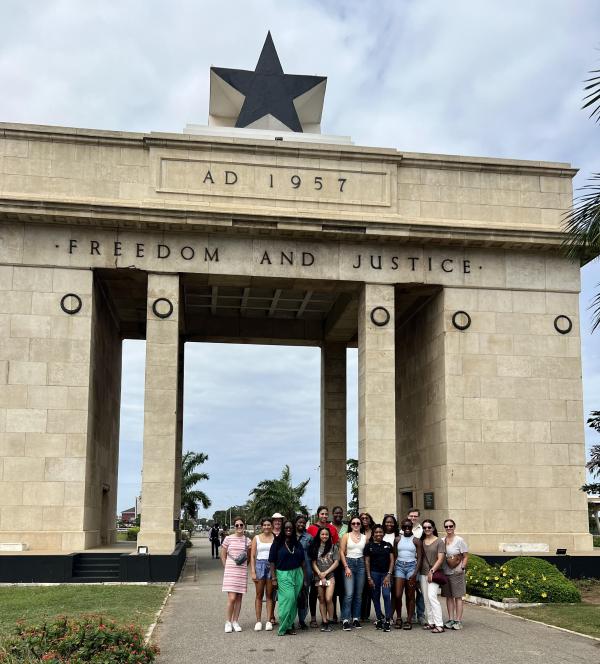Insights on Global Perspectives in Service-Learning, HESP’s First Education Abroad Opportunity in Accra, Ghana
Students in the Department of Hearing and Speech Sciences (HESP) recently returned from the department’s first education abroad opportunity: A Global Perspectives in Service-Learning (HESP-GPS) trip to Accra, Ghana led by Assistant Clinical Professor Eliza Thompson.
For ten days spanning late July and early August, a mix of 15 undergraduate and graduate students worked with individuals with autism, cerebral palsy, and other special needs in schools, clinics and nonprofits that include Hope Setters Autism Center, the Mission Clinic, the Korle Bu Teaching Hospital, Bright Steps International School, the University of Winneba’s Au.D. program, Talking Tipps Africa, and more.
Attending graduate students received clinical hours, and undergraduate students earned observation hours—though students walked away from the experience with so much more.
“Witnessing the positive impact of communication strategies in a different context deepened my understanding of the field,” said Robyn Toler, a 2021 HESP alumna who is currently pursuing her M.A. in speech-language pathology from UMD. “My time in Ghana significantly shaped my career aspirations.”
Toler also mentioned how collaborating with local clinics, organizations and peers greatly helped her and fellow HESP students “bridge a gap” between the classroom and real world experiences; close cultural divides and misunderstandings in the field; incorporate cultural sensitivity into clinical practice; and come to understand the unique problems facing Ghana’s ability to help its citizens.
Seetal Ahluwalia, a senior HESP major and Spanish language, culture and professional contexts minor, agreed that the trip was a necessary step in expanding their knowledge and deepening their understanding of “cultural competency” in treating patients of different racial and ethnic backgrounds.
“We were able to practice these skills firsthand through our presentations at the clinic sites we visited by including culturally relevant materials and considerations,” Ahluwalia said.
Something Ahluwalia also appreciated was how, despite limited resources, Accra professionals were always interested in learning the newest ways they might be able to help their patients.
In a post on the travelers’ shared blog, Ahluwalia wrote: “In Ghana, only 2% of children with disabilities are provided special education, as there are fewer than 29 ‘special’ schools. In these schools, less than two out of 40 special needs teachers are using high-tech devices in the classroom, while only five out of 40 use low-tech devices. Though lacking in resources, all of the clinicians we met remain committed to the success and well-being of their clients, patients, and students. For example, at the training session two of my classmates and myself conducted on augmentative and alternative communication (AAC) at Bright Steps International, we were met with open-mindedness and dedication to learning more in order to better serve their clients.”
While abroad, the students also found time to immerse themselves in Ghana’s culture and history. They visited cultural centers like the Kwame Nkrumah Mausoleum honoring Ghana’s first president; the Independence Arch; Boti Falls, a landmark steeped in mythological significance for Ghana’s people; and slave dungeons and forts like those in Cape Coast Castle.
Still—at least for Toler—the standout experience was interacting with patients like those she hopes to someday serve in a professional capacity.
“Among the many cherished memories, my favorite memories from the trip were witnessing the resilience and determination of the individuals we observed and collaborated with,” said Toler. “Their joy and enthusiasm in the face of challenges left a lasting impression on me. The interactions with Ghanaian people was truly a heartwarming experience and encapsulated the essence of the trip, highlighting the transformative potential of speech-language interventions.”
This article was written by Sofia Appolonio, JOUR '26.
Photos of the inaugural cohort of HESP-GPS attendees outside the University of Winneba's speech and hearing center (main) and the cohort in front of the Independence Arch (body) is provided by Eliza Thompson.
Published on Tue, Sep 5, 2023 - 4:21PM



